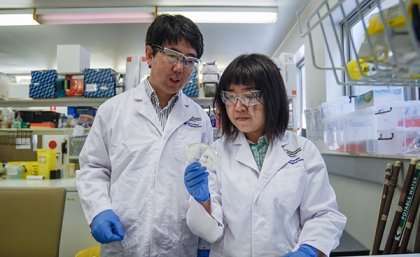Non-antibiotic drugs also speed up the spread of antibiotic resistance

New research from The University of Queensland has found non-antibiotic pharmaceuticals can significantly promote the spread of antibiotic resistance via bacterial mating.
A study led by Dr Jianhua Guo from UQ's Advanced Water Management Centre said while antibiotics were known to promote antibiotic resistance, it wasn't known if non-antibiotic pharmaceuticals could also increase bacterial conjugation.
"Bacterial conjugation is the exchange of genetic material between bacterial cells by direct cell-to-cell contact or by a bridge-like connection between two cells," he said.
"It's believed bacterial conjugation, or bacterial mating, is one of the major pathways to the spread of antibiotic-resistant genes.
"Recently, we started wondering if non-antibiotic pharmaceuticals such as carbamazepine – a prescription drug used to treat epilepsy and neuropathic pain – can accelerate the transmission of antibiotic resistance through bacterial conjugation."
More than 1,000 tons of carbamazepine is consumed worldwide each year.
It can accumulate and remain in various environments for years because of its resistance to biodegradation.
UQ PhD student Yue Wang said the research found carbamazepine significantly enhanced the bacterial conjugation not only within the same bacterial species, but also across bacterial genera.
"This discovery provides strong evidence that carbamazepine at environmentally relevant concentrations directly promotes the transfer of multi-antibiotic resistance genes," Dr Guo said.
"Further work is required to investigate if similar effects have been caused by carbamazepine in human gut microbiota."
The discovery, along with previous studies by the group on triclosan and fluoxetine, is a warning to re-evaluate the potential roles of non-antibiotic pharmaceuticals in the spread of antibiotic resistance.
Antimicrobial resistance has become a major threat to public health globally with approximately 700,000 people a year dying from antimicrobial-resistant infections.
The finding coincides with World Antibiotic Awareness Week, which aims to increase global awareness of antibiotic resistance.
The study has been published in The ISME Journal.
More information: Yue Wang et al. Antiepileptic drug carbamazepine promotes horizontal transfer of plasmid-borne multi-antibiotic resistance genes within and across bacterial genera, The ISME Journal (2018). DOI: 10.1038/s41396-018-0275-x
Journal information: ISME Journal
Provided by University of Queensland




















